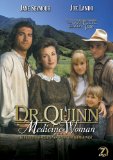| Reviews & Columns |
|
Reviews DVD TV on DVD Blu-ray 4K UHD International DVDs In Theaters Reviews by Studio Video Games Features Collector Series DVDs Easter Egg Database Interviews DVD Talk Radio Feature Articles Columns Anime Talk DVD Savant Horror DVDs The M.O.D. Squad Art House HD Talk Silent DVD
|
DVD Talk Forum |
|
|
| Resources |
|
DVD Price Search Customer Service #'s RCE Info Links |
|
Columns
|
|
|
Dr. Quinn, Medicine Woman: The Complete Season Two
Quite effective again when it sticks to heart-tugging romance and family drama amid the post-Civil War Rocky Mountains...but be careful when it starts to preach and "teach." CBS DVD and A&E have re-released Dr. Quinn, Medicine Woman: The Complete Season Two, a seven-disc, 22-episode collection that represents the sophomore (and first "full") 1993-1994 season of the popular Saturday night CBS family drama. Starring the beautiful, talented Jane Seymour and handsome, easygoing Joe Lando, this season of Dr. Quinn, Medicine Woman advances the viewer-popular relationship between Dr. Mike and Sully, while continuing to beat the drum for problematic social issues circa the late 1900s...or the mid 1990s, if you close your eyes and forget this is a period Western. Passionate, yes. Mostly effective, certainly. But also quite cagey and calculated...and downright dishonest, whenever things get a little complicated and sticky.
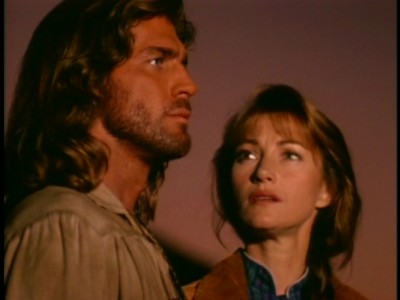
A little retread for those who aren't familiar with the series...or my first review. Boston, immediately following the Civil War. Michaela Quinn (Jane Seymour), under the tutelage of her physician father, has become a doctor, as well―a rare occurrence for a woman even in the more liberated East. However, when Michaela's father dies, his and his daughter's practice dies with him (so much for liberal Boston), so Dr. Quinn picks up stakes and moves clear cross the country to Colorado Springs, Colorado, where she answers an advertisement for a town doctor. Once it's discovered that the lovely young lady steppin' off the coach is the podunk burg's new sawbones, all manner of fractious bedevilments a'start to ailin' the town folk. Put plain and simple in 1867 America: no one out West trusts a woman doctor...no matter how temptin' it might to have the lovely "Dr. Mike" take yer temperature. Storekeeper Loren Bray (Orson Bean) is a gen-u-wine Western grump who scoffs at the notion of havin' a female treat his hernia. Jake Slicker (Jim Knobeloch) is the town barber and head racist, and his ministrations should be good enough for anyone―so what if his most accomplished doctorin' consists of a shave and a haircut? Bar owner and pimp Hank Claggerty (William Shockley) is openly contemptuous of Dr. Mike, as well...when he's not looking her up and down and licking his chops.
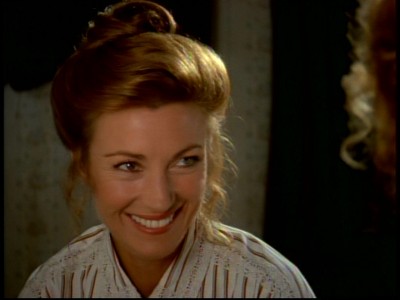
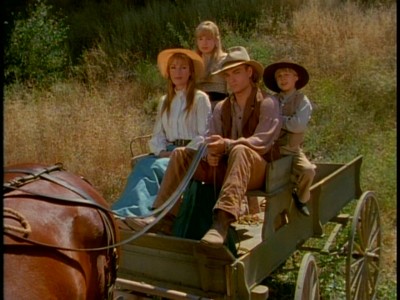
Luckily, those three young'uns Dr. Mike adopted when their maw up and croaked have finally settled down to their new little family group. 18-year-old Matthew Cooper (Chad Allen), 13-year-old Colleen Cooper (Erika Flores), and 11-year-old Brian Cooper (Shawn Toovey), weren't sure at first what to make of this Eastern city slicker who seemed to have all the answers to everythin', but her obvious love and devotion to them has now won them over. Only they and the town's outcasts seem to cotton to the newcomer, though: perpetually homely telegraph operator Horace Bing (Frank Collison); wishy-washy, newcomer Dorothy Jennings (Barbara Babcock), an old flame of Loren's; totally non-threatenin'-in-any-sexual-manner town preacherman Reverend Timothy Johnson (Geoffrey Lower); runaway slave-turned-town blacksmith Robert E. (Henry G. Sanders); sassy outdoor café owner Grace (Jonelle Allen); and town whore-with-a-heart-of-gold Myra Bing (Helene Udy). Oh, and also Byron Sully (Joe Lando), a compact little mountain man drippin' with sweaty, musky sex appeal (mostly from constantly wearing leather, regardless of the heat), a perpetual Elvis sneer, and a mane of hair that would rival Samson and/or Victor Mature. Forever broodin' attractively over his tragic past, Sully wages a constant war of attraction/repulsion at the thought of becomin' involved with the dewy Dr. Mike...who battles her own desire to tear off every inch of buckskin Sully wears. Can Dr. Quinn single-handedly bring Eastern enlightenment to these bigoted, racist, gender-biased, ignorant Western sh*tkickers?
MAJOR PLOT SPOILERS WARNING
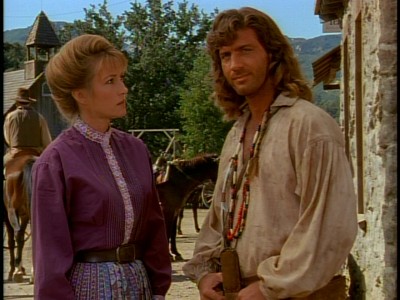
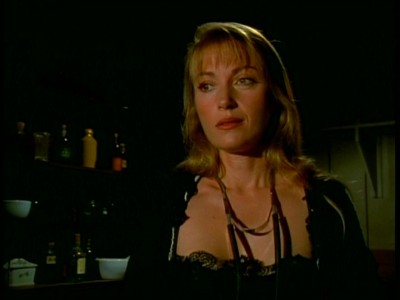
Having just recently reviewed Season One of Dr. Quinn, Medicine Woman, and having found it enjoyable yet slightly silly when it grafted its modern P.C. concerns onto its mid-19th-century framework, I was curious to see how the series would shake out during its sophomore session―always a critical moment in a series when the writers either build on a show's initial promise...or fall back onto increasing repetition. Interestingly, this next go-around of Dr. Quinn, Medicine Woman does quite well in amping up the show's pluses, particularly the romantic dilemma between fiercely passionate virgin Dr. Mike, and increasingly sullen Nature Boy, Sully. There are several good stories that fit well within the series' Western drama genre expectations, while even one or two of its "message" episodes succeed through sheer force of will alone. Unfortunately, when Dr. Quinn, Medicine Woman does openly preach (particularly about American Indians), its bias and evasions are painfully evident.
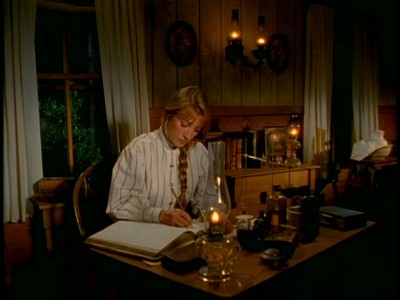
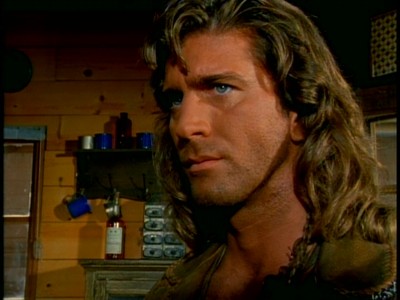
Dr. Quinn, Medicine Woman's need to continually inject mid-1990s political and sociological viewpoints into its 19th-century stories doesn't bother me on principle; after all, the American Western genre has proven to be perhaps the most flexible of the more traditional film genres when used as mirrors of contemporary times. Certainly one doesn't have to look further than the so-called "adult" Westerns of the big screen (beginning in the 1940s) and television (in the 1950s) to see how malleable the genre is when used as a reflector of contemporary concerns. If younger fans of Dr. Quinn, Medicine Woman, who have little experience with older TV Westerns, think this series invented the socially-conscious Western, they can go to their local libraries, or Amazon.com, or some of the more obscure cable networks to sample 50+ year-old Gunsmoke or Wagon Train episodes, where most of Dr. Quinn's more serious themes were already hashed out long ago. So if Dr. Quinn, Medicine Woman wants to have an episode like the season opener, The Race, where Dr. Mike strikes a blow for feminism by masquerading as a man to enter a grueling horse race (the effort to disguise the luminous Seymour is ludicrous), and where little boy Brian wants to enter a pie-baking contest, it's innocuous enough.
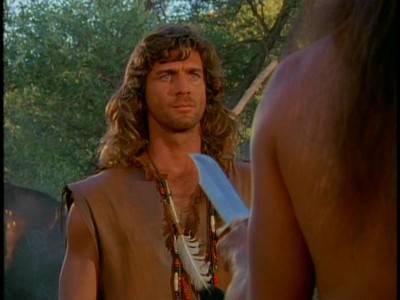
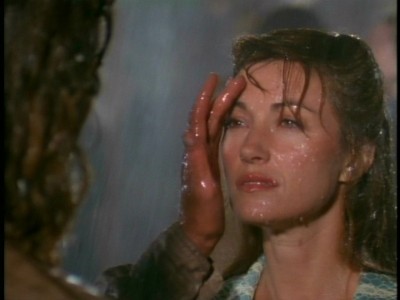
More serious themes such as wife-beating (Sanctuary), menopause (Giving Thanks), union organizing (Crossing the Line), drug addiction (Life and Death), and child abuse (Just One Lullabye), may be codified in terms and in actions and reactions that are entirely 20th century...but they still work here in Dr. Quinn, Medicine Woman because we accept the pliable nature of the Western context. The "Old West" is a mythical place to all but historians, anyway (such is the pervasive influence of fictional films and television), so most viewers regard it as a place as "unreal" as science fiction (can't wait to see the semiological stew created by this summer's Cowboys Versus Aliens). The themes are deadly serious here; however, even if we don't always buy how these 19th-centure characters behave or talk in reaction to these situations, we go along because the context is so obviously grafted onto a set of genre expectations we have tattooed in our DNA. A good example is the powerful The First Circle, which details the coming of the Klan to Colorado Springs, and the indignities suffered by blacksmith Robert E. and his wife, café owner Grace, when they buy a home in town. Everything is tied up a little too neatly at the end (isn't that most TV?), with our three resident fence-sitting racists, Hank, Jake and Loren, suitably chagrined at their half-hearted participation in the Klan activities, while Robert E. and Grace charitably forgive and forget. The dynamics and dialogue may be Selma, '63, rather than Colorado Springs, 1867, but scripter Toni Graphia doesn't shy away from showing the crushing humiliations that both Robert E. and Grace suffer at the hands of the Midnight Riders, making for a memorable, if familiar, episode.
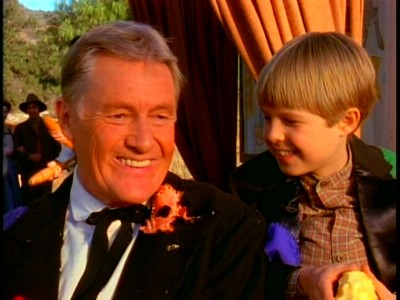
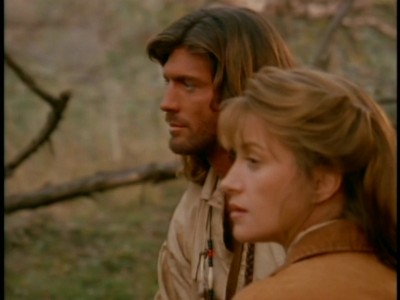
Where Dr. Quinn, Medicine Woman gets into serious trouble this season is when it frequently tries to tackle the complicated, morally ambiguous battle between White and Indian society. Most viewers will be able to shrug off the show's more obvious, relatively innocuous bias moments, such as in The Incident, where Sully actually says, The Cheyenne don't lie, a continuation of the "noble savage" stereotype that in recent decades has taken on almost mythological proportions in most American films featuring Indian characters (to suggest that an entire race or group of people are devoid of any negative human behaviors is of course, ridiculous). However, Dr. Quinn, Medicine Woman ups the ante this season for depicting Indians as almost-otherworldly figures of enlightenment and peace, continually skewing―or outright lying about―its presentation of the war between Whites and Indians to avoid any "complicated" feelings in the viewers, feelings that might jar their P.C. complacency.
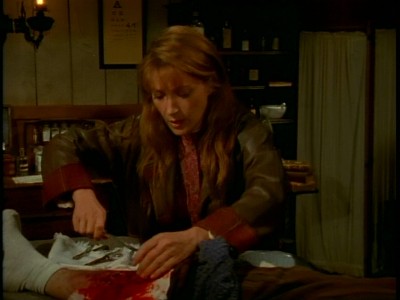
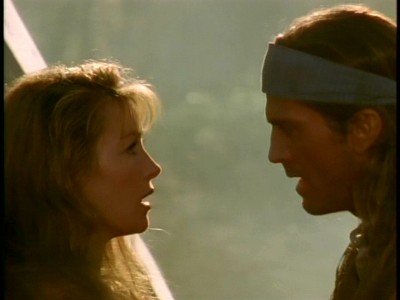
It's easy to go along with Dr. Quinn, Medicine Woman's assertion, in Where the Heart Is, that, "The Indians aren't savages, the Army is," a sentiment echoed frequently in the mainstream media during this Clintonian time period, because Dr. Quinn, Medicine Woman helpfully never shows Indian atrocities. Only boorish, insensitive, racist, violent behavior by Whites is tolerated on Dr. Quinn's screen. White settlers are depicted as either ignorant hicks who can't fend for themselves (in this episode, the insufferably smug, Christ-like Dancing Cloud, played by Larry Sellers, sanctimoniously helps the dehydrating townsfolk during a drought, stating that the great Spirit has instructed him to "take the hand of the child, and guide him" through the troubles―a dismissive, patronizing depiction of the resourceful, courageous pioneers who helped settle the West), or blood-thirsty, racist animals who rage for vengeance, a vengeance carried out with cold, psychotic calculation by the U.S. Army (Dr. Quinn, Medicine Woman's favorite villain is General Custer). When Indians do attack, in the form of the terrorist Dog Soldier bands, their actions are always off screen, with those unseen attacks always ameliorated and equivocated by Sully or Dr. Mike essentially saying, "Those settlers asked for it." In Dr. Quinn, Medicine Woman, it's easy to view even the terrorist Dog Soldiers as the aggrieved, when one is never shown the results of their actions, such as torture and rape (in Another Woman, everyone is mortified that a White woman, captured as a child, had to see her Indian family massacred by the Army...but no one expresses any similar outrage over the original Indian attack that saw her kidnapped and married off in the first place, which Sully delicately, politely, and without a shred of irony, states as, "How old were you when you came to live with the Indians."). Pointing out this one-sidedness isn't a backdoor defense of Indian policy by the U.S. government, or the actions of the U.S. Army during that conflict―it's merely an acknowledgment that Dr. Quinn, Medicine Woman stacks the deck in favor of presenting a view of history that's skewed strictly to one side. And to solidify that view, Dr. Quinn, Medicine Woman will perpetuate myths, such as The Offering's notion that the U.S. Army deliberately committed biological genocide against the Indians with infected blankets (no doubt influenced by then-popular garbage research from that risible charlatan, Ward Churchill), or take political positions with its characters that center-right America probably found hard to stomach (in Buffalo Soldiers and The Abduction, Dr. Mike and Sully act as spies for the Cheyenne who are harboring Dog Soldiers, which results in the death of U.S. calvarymen―actions the scriptwriters may have thought put Dr. Mike and Sully in the light of war protestors fighting an unjust government...but which actually have the effect of painting both as traitorous amateurs with blood on their hands).
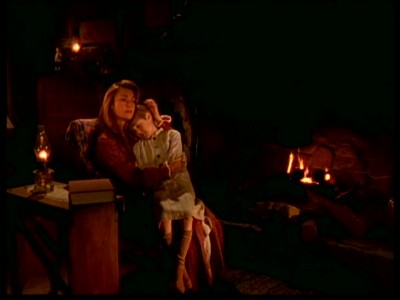
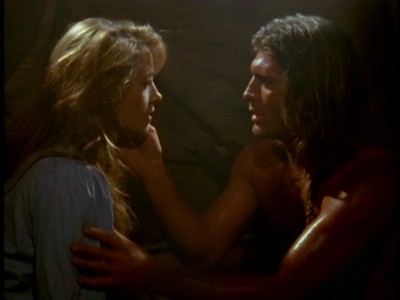
Fortunately, Dr. Quinn, Medicine Woman is so schizophrenic that objectionable material such as mentioned above can be immediately followed by slickly-crafted romantic/family drama of the highest order. Certainly, the central story arc of Dr. Mike's and Sully's relationship is further exploited here this second season, with the two-parter, Where the Heart Is, expertly crafted to finally bring their feelings out into the open. With Dr. Mike called back to Boston (some clever art direction here to hide the studio mock-ups of the city), where she begins to fall in love with fellow doctor Edward Albert, Sully packs up and heads East, going from Tarzan to Rhett Butler in a romance story taken right out of the pages of one of those Harlequin Romances®. Wisely, the writers immediately dial back from both Sully and Dr. Quinn saying they love each other, putting obstacles in their way so the viewer doesn't become sated with uneventful domesticated bliss. And to Seymour's and Lando's credit, the two have real chemistry together, giving these tentative, awkward moments of passionate courting and misunderstandings and break-ups, some good shading. Other solid entries that favor romance and family drama over politics and sociology include Halloween, an amusing little holiday treat that finds Tom Poston popping up "dead" over and over again, while Dr. Quinn, Medicine Woman's best actor (for my money), Shawn Toovey, has a wonderful subplot where he thinks Dorothy is a witch, and where he's comforted by her when he lets on how much he misses his deceased mother (a wonderful, sensitive scene with Babcock and Toovey). Saving Souls sees Johnny Cash return as Kid Cole, this time sparking with his real-life wife, June Carter Cash, in a solid story about faith and medicine (she's not only a better actor than Johnny, but a hell of a good actor, to boot). Giving Thanks is a touching Thanksgiving story, made interesting by the revelation that Dr. Mike is a virgin, fearful of giving vent to her heated, sublimated passions (Seymour, who played one of television's most notable perverted whores in John Steinbeck's East of Eden miniseries, is equally good at this kind of prim-yet-simmering beauty rose). Not surprisingly for a family drama, another holiday episode scores, with Mike's Dream...A Christmas Tale bringing back deceased Dianne Ladd as a Christmas ghost to guide Mike through this Christmas Carol adaptation (it's clever when she refuses to show Mike―and us―if her future involves Sully). The Luck of the Draw is a familiar tale of gambling, but it features a nice turn from always-welcome Craig Wasson as a cynical gambler. The Circus, my favorite episode this season, is a wildly improbable little fable―made all the more sweet because of its fantasy―about a run-down circus-of-two coming to town to give the inhabitants of Colorado Springs a reason to celebrate their lives (Fionnula Flanagan and Lisa Reiffel are perfect here, in Jeanne C. Davis' poignant, magical script). And the two-part season wrap-up, Return Engagement, makes good use of Maxwell Caufield as Mike's long-lost fiancé, while Frank Collison gets a chance to be even funnier on his wedding night with Helene Udy (who has a sweet chemistry with Collison).
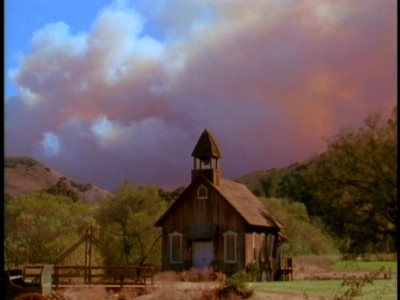
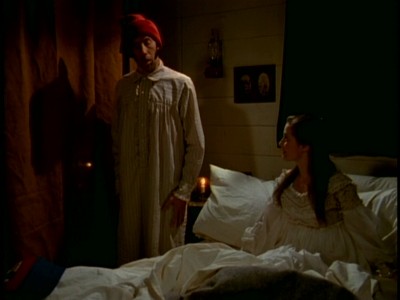
There's no denying that Dr. Quinn, Medicine Woman found some kind of audience on Saturday nights, a night that had ebbed and flowed as far as finding favor with audiences over the years, and which by 1993 had been all but written off by the networks again. It's probably enough to say that for the 1993-1994 season, Dr. Quinn, Medicine Woman was the only Saturday prime-time show to make it into the Nielsen Top Thirty year-end ratings...but there was no denying that its movement was all downhill at this point. Riding that first half-season wave of publicity in the winter and spring of 1993, where it garnered an entirely respectable 23rd slot in the Nielsen's Top Thirty for the year, by the end of the 1993-1994 season, it had dropped three positions to end out the year at 26th...and it wouldn't return. It certainly didn't have any direct competition to speak of that season, with weak sitcoms George and Where I Live on ABC, and The Mommies (truly wretched) and Café Americain over on NBC, giving little threat to Dr. Quinn, Medicine Woman's family audience (I'll bet Fox's Cops, though, beat it every time in the all-important demographics). Next season, the show would free-fall out of the Nielsen's as the show's newness rubbed off.
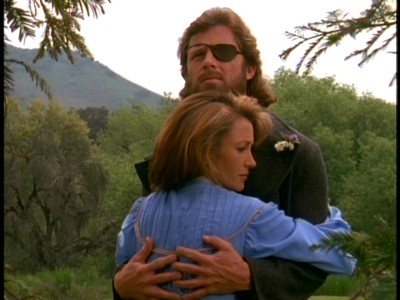
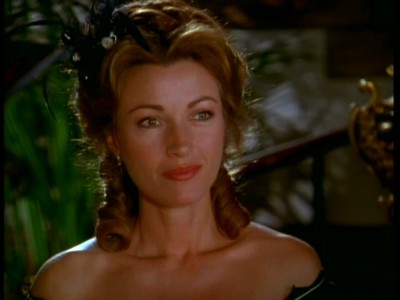
The DVD:
The Video:
Since the back cover states nothing about "remastered" episodes, and since the extras all appear to be quite dated, I'm going to assume the full-screen, 1.33:1 video transfers for Dr. Quinn, Medicine Woman: The Complete Season Two are the same ones used for previous disc sets of this series. As they stand, they're reasonable, with okay color, a sharpish picture, and the expected screen anomalies, like minor dirt and scratches.
The Audio:
As with Season One, The Dolby Digital English 2.0 stereo audio mix is surprisingly nimble, with quite a bit of left-right effects and separation. Not bad for this kind of show. No subtitles or close-captions, however.
The Extras:
The main extra this go-around is a full episode commentary track by star Joe Lando for Best Friends. It's too bad someone couldn't have let Lando be that funny on the first two seasons of the show, because he's got a self-deprecating, sardonic sense of humor on this track that I found quite amusing. No date given for this commentary track, but he states he's watching the episode about 7 years after the fact, so that puts it around 2000: definitely not a new bonus feature. The 10:46 featurette, Beginnings, looks at the series' impact, but no credits, end titles, or date is given (they're edited off), so I'm assuming it's some kind of A&E filler from another show. Text extras like bios (all outdated by years), guest stars and awards are included―not much use.
Final Thoughts:
Everything is heightened and polished off in this second season of Dr. Quinn, Medicine Woman: The Complete Season Two―its strengths and its weaknesses. Westerns on TV have been politicized since Gunsmoke, so I don't mind Dr. Quinn's efforts to make its Western stories "relevant." Just be forewarned that that relevancy isn't always equally applied...or all that truthful, for that matter. Still, when Dr. Quinn, Medicine Woman: The Complete Season Two lays off the politics and heads for the heart, it's a surprisingly effective drama, and a highly recommended one, at that.
Paul Mavis is an internationally published film and television historian, a member of the Online Film Critics Society, and the author of The Espionage Filmography.


|
| Popular Reviews |
| Sponsored Links |
|
|
| Sponsored Links |
|
|
| Release List | Reviews | Shop | Newsletter | Forum | DVD Giveaways | Blu-Ray | Advertise |
|
Copyright 2024 DVDTalk.com All Rights Reserved. Legal Info, Privacy Policy, Terms of Use,
Manage Preferences,
Your Privacy Choices | |||||||









